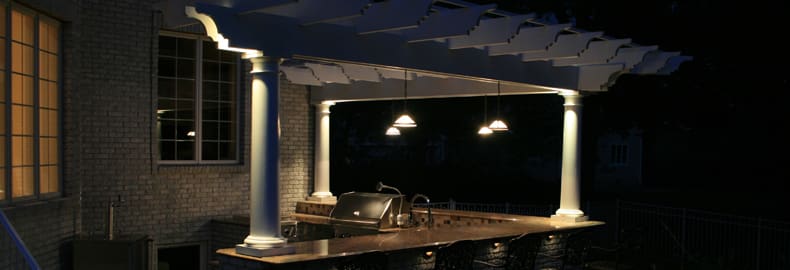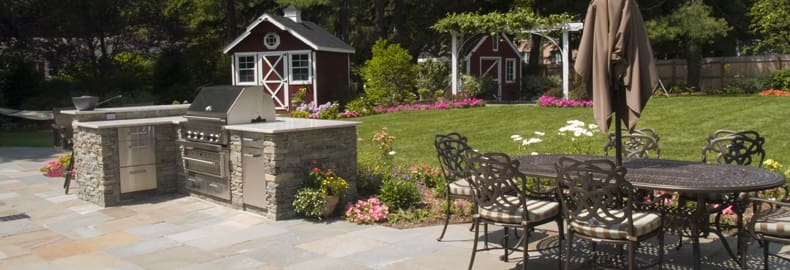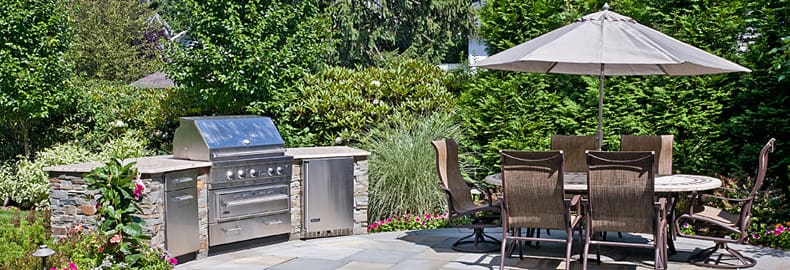An outdoor kitchen is a great feature that will provide years of outdoor enjoyment for your family. It expands your dining and entertaining space and allows you to spend more time outdoors all year-round. With proper planning and design, you can make the perfect outdoor kitchen a reality for your northern NJ home.
For best results, hiring a professional licensed outdoor kitchen contractor is highly recommended. An outdoor kitchen is a high-end project that requires proper planning and design. A basic kitchen design with a few quality appliances will cost several thousand dollars. A luxury kitchen with state-of-the-art appliances and special features will cost much more. Work with a professional contractor who can guide you through the process and eliminate costly mistakes.
Outdoor Kitchen Design

Outdoor kitchens can be laid out in various shapes, just like indoor kitchens – U-Shape, L-Shape and Galley Style. The size and layout depends on the appliances and equipment that you select, but outdoor kitchens are usually divided into four zones.
- Prep Zone – Includes equipment used for preparing food such as a sink, cutting boards, paper towel bins, trash bins, storage drawers and cabinets. The prep zone gets messy, so easy cleanup is important.
- Cooking Zone – Includes appliances for cooking such as a grill, oven, smoker, side burners, griddles, deep fryers and storage areas. The cook will spend most of his/her time in this zone. It can be helpful to add a fan, exhaust and adequate lighting.
- Plate and Serve Zone – This area includes warming drawers and cabinets, garnish centers and storage areas for dishes, glassware and napkins. You want adequate counter space for plates and glassware.
- Entertaining Zone – This area includes a refrigerator, beverage center, wine cooler, keg tapper, ice machine, bar supplies, storage areas and seating. Allow at least 24” between seats and adequate knee room for comfort – 12” for bar height and 15” for counter height. If you have more than four seats, you should curve the counter to provide comfortable conversation.
The layout of your outdoor kitchen should create a natural flow between cooking and entertaining guests. Provide enough storage for cooking utensils, grilling tools and cleaning supplies. If you plan to entertain a lot, consider adding a dishwasher to your outdoor kitchen for convenience.
Basic Design and Layout Requirements

- How you will use your kitchen and how often?
- Do you entertain a lot?
- Do you entertain large groups of people?
- Do you prefer quiet family dinners?
How you use your outdoor kitchen will determine necessary kitchen equipment and space requirements for your design and layout.
A typical outdoor kitchen usually includes a gas grill, side burner, compact refrigerator, roll-out trash bin, storage drawer and grill cover. If you plan to cook for large groups of people, you may want to add more equipment such as extra side burners, double door pantries, storage drawers, warming drawers, a drop-on griddle, a sink, an ice maker, a bar with a wine cooler or beer kegerator, an outdoor vent hood and various cooking utensils and accessories.
Hiring a professional contractor with expert knowledge and skills needed to build an outdoor kitchen, will give you the best results. Outdoor kitchens can range from $2,000 with minimal equipment to more than $50,000 with all the bells and whistles. Determine how you plan to use your outdoor kitchen to avoid buying things you don’t really need.
Plan for Proper Utilities

Outdoor kitchens require power and water. Gas appliances need a gas line. Electric appliances need wiring and electrical power. Refrigerators, ice makers and dishwashers need a water line. Proper planning of all utility connections and outlets is essential. Work needs to be done by a licensed contractor that’s familiar with local building codes and regulations in your northern NJ area.
Electrical
You need to provide electrical power for a rotisserie system, refrigerator, ice machine, blender and other electric kitchen equipment. Extra outlets should be installed for convenience. All outdoor outlets must be grounded (GFCI), the ground fault circuit type. You should install outlets above the counter for small appliances and outlets below the counter for refrigeration, BBQ lights, BBQ ignition and water heaters.
It’s important to provide a dedicated circuit for any refrigeration appliances as they typically need more amperage. You can install switches for any outlets that run refrigeration equipment to avoid unplugging them to turn them off.
Water
You need a water line for a sink, dishwasher and ice maker. Most outdoor kitchens only include a cold water line, but a hot water line can be installed if you want one. An under-counter water heater can often be installed below the sink for hot water use. This is usually less expensive than running a hot water line from the house.
In cold northern NJ weather, you need to protect pipes and water lines from freezing. In many areas you need a shutoff valve, a drain and a proper plan for waste water. The technical issues involved with these requirements are best left to a professional licensed contractor who knows local building codes and regulations.
Gas
You need a gas line for a gas grill and other gas appliances. The gas line needs to connect to the main gas supply at your house. The gas line size and pressure are crucial to proper operation of equipment. The gas line size is different for gas and propane. It’s important to ensure the proper BTUs needed for all of your outdoor kitchen equipment and a load test may be required. Work should be done by a professional contractor who understands these requirements and proper installation procedures.
Permits
If you require utilities like electrical, water and gas for your outdoor kitchen, you will probably need building permits to do the work. A licensed contractor can help you with necessary permits. Depending on local building codes, there may also be setback requirements related to your Bergen County property. Fire codes must be complied with to protect against hire hazards.
An outdoor kitchen is a great home addition, but it needs to be installed properly and meet all building code regulations. It’s recommended that you hire a professional licensed contractor to build your perfect outdoor kitchen for life time enjoyment.
